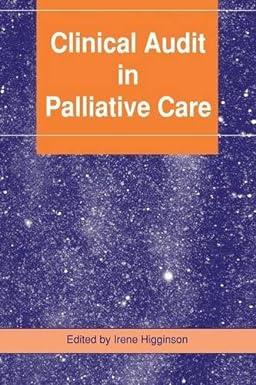Question
In his capacity as an audit senior, B spent the last day of the financial year performing stocktake observation procedures. His assignment that day included
In his capacity as an audit senior, B spent the last day of the financial year performing stocktake observation procedures. His assignment that day included taking test measurement at a clients grain silo in a small country town. B had assessed grain stocks on two previous audits and was the senior-in-charge in this audit.
Bs observations of the quality if grain in the silo fell 10% below the clients records. Bs attention was drawn to the discrepancy in the two measurements of what was in the silo because, in his judgement, such a gap was significant enough to be material. The resulting difference between stock as reported by the client and the audited amount was enough to cause a significant drop in net profit. B documented his findings in the work papers and proposed an adjusting entry for the difference.
Upon investigating the matter further, B determined that a discrepancy in the gain stocks had also surfaced two months previously. The quantity of grain as reported by a government inspector at that time was lower than that on the clients records. The difference in the stock valuation, however, was not as great as that in Bs tests. Still no adjustment to the clients record was made. This information was also documented in the audit work papers
Prior to discussing the discrepancy with the client, B told F, the audit partner, about the problem. F, who had substantial experience in the industry, advised B that this would be a sensitive issue with the client. She also pointed out that grain stocks are notoriously difficult to measure, with the potential for errors as large as 10%. F promised that she would handle the matter personally and therefore told B not to discuss the discrepancy with the client. The audit partner kept the stock work papers.
After completion of the field work, B returned to the office to wrap up his work on the audit engagement. The stock audit work papers were still not in the file. Upon Bs inquiry, F handed him a new set of work papers.These work paper which has been dated as of the audit date, had been signed off by F and substantiated the book amount. Bs subsequent questioning of the partner revealed that F had personally performed additional work on the grain inventory after the clients year end. Based on her own evidence gathering, the partner had substituted her own work papers for the documents. An unqualified opinion was subsequently issued.
1. What are the ethical issues and fundamental principles that need to be considered?
2. Consider alternative courses of action and recommend what B should do.
NB: fundamental principles are Integrity, Objectivity, Professional competence and due care, confidentiality, and professional behavior
NB: Determine the appropriate course of action that is consistent with the fundamental principles identified
Step by Step Solution
There are 3 Steps involved in it
Step: 1

Get Instant Access to Expert-Tailored Solutions
See step-by-step solutions with expert insights and AI powered tools for academic success
Step: 2

Step: 3

Ace Your Homework with AI
Get the answers you need in no time with our AI-driven, step-by-step assistance
Get Started


